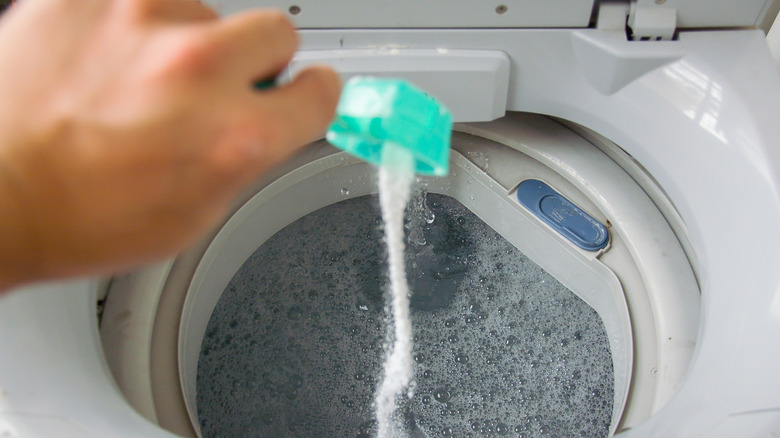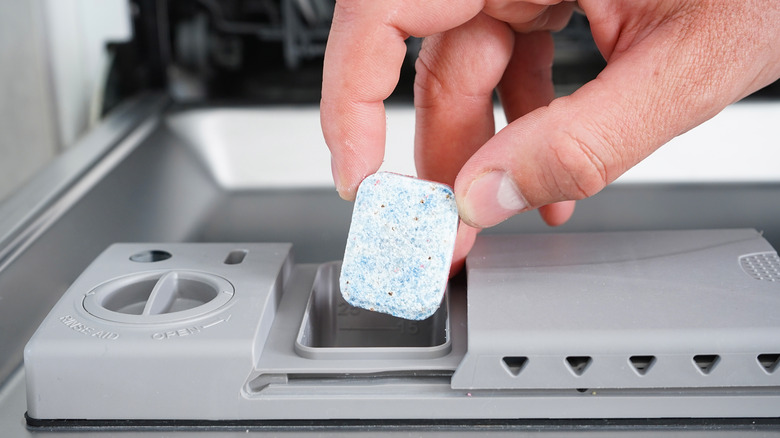Do You Have To Use The Product Your Appliance Recommends?
When you purchase a new kitchen appliance for your home, you may have noticed that the manufacturer sometimes recommends making use of certain brands of detergents, oils, or other products with it. Is this a tip that will make your tools and appliances last longer, or can you use any brand or generic product that you want? Although you can use the recommended brand, you do not necessarily have to stick to what your appliance manufacturer suggests. This usually indicates that the appliance and the product have some sort of marketing agreement, meaning it's almost like an advertisement rather than a requirement. When there's a sticker on the machine or a label that recommends a certain brand of product, it's basically an ad that you see every time you use the machine, making it highly effective.
As @melissadilkespateras on TikTok says, though, you are able to use whatever branded product you want with your dishwasher or other appliance, regardless of what the manufacturer recommends. "If it's in good working condition and if you use a quality detergent, no matter which one that is, you do not have to use what they recommend."
You also may find when you purchase a new washing machine that the manufacturer even includes small samples of its preferred brand of detergent. This is another marketing effort and not a requirement for use.
What to look out for
Although you do not have to match the brand that your home appliance manufacturer recommends for its consumables, you may want to pay attention to the recommended format.
For example, when you are using your washing machine, you can select among powdered detergent, liquid detergent, and pod forms of detergent. The brand that you select to use doesn't have to match the manufacturer's suggestion, but you may want to stick with the format. Some machines work better with liquid or powder, so the manufacturer will tell you to use one over the others. Additionally, your manufacturer may suggest that you only use high-efficiency (HE) detergent with your washer. Failing to follow the manufacturer's recommendations for HE usage could cause the machine to make too many suds and may affect the machine's operation. You can use whatever brand of HE soap that you want, though.
You may find similar recommendations when changing the oil in your lawn mower or in your motor vehicle. It's more important to pay attention to the grade and viscosity of the oil than it is to focus on the brand. Water softeners often have similar recommendations for brands and types of salt to use. Pay less attention to the recommended brand and more attention to the format in which the salt appears, such as pellets or cubes, as well as solar salt versus evaporated salt.
Is there any issue with using or not using the brand the manufacturer recommends?
There is one primary instance where not following the manufacturer's recommendations regarding a particular brand of consumables could cause problems for you. You may void the warranty if you use a non-recommended brand that causes damage to the machine or appliance. For example, if your furnace manufacturer recommends a particular size of filter from a certain maker, and if you go with a different brand that doesn't fit quite right, eventually causing a failure of the furnace, it's possible that the improperly installed filter may lead to a voiding of your warranty.
This would be a rare occurrence, but it could happen. Read through your user manual for the appliance or through the legal terms for your warranty to see if it has any language related to using certain brands of consumables.
If you simply don't want to risk any potential warranty problems, no matter how rare, you could just go ahead and switch to the brand of consumable that your appliance manufacturer recommends. The primary problem with following this plan is that the recommended option may have a significantly higher cost than a generic option that you want to use. Often, generics have a similar formula to the recommended option, but marketing costs drive up the price of branded products. However, not all generic products are created the same, meaning some of them may deliver less-than-ideal results for you.


